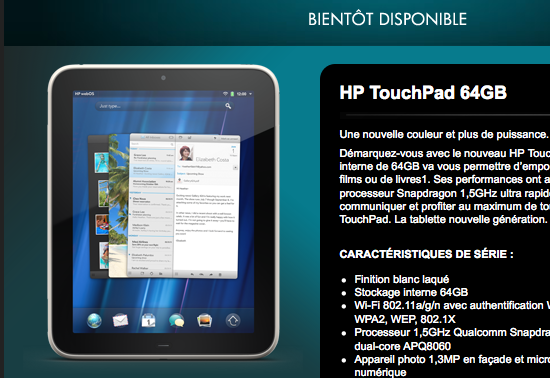
There have been rumors about HP updating the HP TouchPad, the company’s first-ever webOS-based tablet device, even if the original TouchPad hasn’t been out for all that long. In fact, for those on AT&T’s network looking forward to getting their hands on the tablet device, rumors about the improved device heading to AT&T’s LTE network picked up in early July, thanks to some leaked information. Since then, though, word on the updated device has seemingly all but disappeared. That is until yesterday, when it was confirmed that a significantly upgraded device was heading to France and other European countries in as early as two weeks. But, will it even matter?
First, let’s just admit that you can’t play with a consumer’s emotions. The consumer is the lifeblood to your company, at all times. There’s no better person than the consumer, because it’s up to them whether or not your device is popular a disaster. For the HP TouchPad, reports that the tablet device haven’t been selling well sounded a death knoll through the whole Internet, with people suggesting that the tablet was dead, or that folks should just concede the market to Apple altogether and just stop the hassle. And considering the original TouchPad (it feels so strange to type that) practically just launched, there’s no reason to already alienate the customers who purchased the tablet right out of the gate, or even a couple of weeks after its launch.
But that’s exactly what HP would be doing by launching a far superior tablet device just months after the initial launch of the original device. That’s like saying, “Here, buy this fantastic tablet! Oh, thanks! Now here’s a better one! Buy this one, too!” There’s no denying that the market for technology moves quickly, and knowing that your favorite piece of technology is going to be outdated sooner rather than later is a constant truth. But, moving too quickly is a bad thing not just for the consumer, but also for the company behind the motion. In HP’s case, the unveiling of a significantly upgraded HP TouchPad in France, and therefore the unveiling of a significantly upgraded TouchPad in general shows that early adopters of the device just should have waited.
So what makes this new TouchPad so great? Well, for starters, it features a dual-core 1.5GHz Qualcomm Snapdragon APQ8080 processor. Additionally, there’s 64GB of built-in storage, and a new shiny white back. Other features, like the 1.3MP front-facing camera are the same as the original TouchPad. But, just that dual-core 1.5GHz processor is worth noting and craving. And while this device in particular is suggested to stay in international markets, and reportedly not show up here in the States, we know that the AT&T LTE-connected version is just missing the 64GB of storage. It still features the 1.5GHz dual-core processor, which is a feature anyone should want in a tablet, especially one as multitasking-oriented as the TouchPad.
So, leaving early adopters out of the picture for a moment, will it even matter if HP launches the updated version for AT&T anytime soon? If sales numbers from Best Buy are any indicator, it’s not just the tablet that people are wary of buying, but it’s the whole experience. I said earlier that folks were talking about other manufacturers giving up the tablet market to Apple, and while the question may seem outlandish, is it really? No matter how much power HP shoves into the TouchPad, because that’s exactly what they’re doing by shoving a 1.5GHz dual-core processor under the hood of the tablet, will it matter in the end? Will sales really explode due to this addition? I guess it’s possible.
In fact, what do you think of the upgrade? Are you someone who bought the original TouchPad, and feel like HP is moving too quickly with an upgrade? Or, have you been waiting to get your hands on the TouchPad until you can get your mitts on that upgraded processor? Or, option three, are you skipping the TouchPad altogether to pick up another tablet? Let me know in the comments below.
Well, I guess the fact that HP has put an end to webOS-based hardware from here on out, answer this question pretty well. Even HP doesn't think an upgraded TouchPad will make a difference.